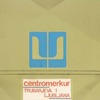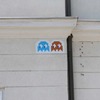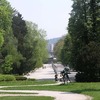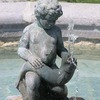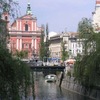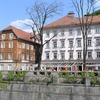The rescue of Tomo Kriznar
Tomo Kriznar, the Slovenian human rights activist who became President Janez Drnovseks special envoy to the western Sudanese province of Darfur, has finally returned to Slovenia after spending more than a month and a half in a Sudanese prison on spying charges. Now that Kriznar is home, the fight for credit and prestige among his rescuers is intensifying.
Kriznar left for the Sudan in February as a special envoy of President Drnovsek, who had launched a campaign to resolve the humanitarian crisis in Sudans war-ravaged region of Darfur. He was one of three envoys sent to Darfur by the Slovenian President with the task of overseeing the peace process in the region. Since he did not get a visa to enter the Sudan, he decided to travel to Chad instead, where there are many refugees from Darfur. Later he crossed over into Darfur, but with the situation there getting more and more dangerous, he turned to African Union forces for help.
Instead of taking him out of Sudan, as had been agreed, they turned him over to Sudanese authorities. He was arrested in late July on the violation of entering Sudan without a visa. The Court of Al Fasher accused him of spying, illegally entering the Sudan, and spreading lies about the Sudanese government and people.
On August 14th he was sentenced to two years in prison and a fine of 2,000 euros. The court also confiscated his property, namely his computer, camera, and satellite phone with footage of the situation in Darfur.
As a result of Mr Drnovseks urging and the efforts of the Foreign Ministry, Kriznar was recently pardoned by Sudanese President Omar Al Bashir and was able to return to Slovenia on September 5th.
The Efforts of the Rescuers
While the special envoy was still in prison, the battle for credit between the Presidents office and the Foreign Ministry had already begun. It seems that this rescue mission has once again proved that Slovenias foreign policy is not above the petty disputes that characterize the countrys domestic governance. In a typically Slovene way, the Kriznar drama has become cause for rows between government officials.
In the end, Kriznars rescue seemed a triumph for Slovenian diplomacy, but it also provoked questions such as why the envoy did not have a diplomatic passport, which would probably have saved him and the Foreign Ministry a lot of trouble. At the same time, Slovenian officials cannot simply absolve themselves of blame by saying that Kriznar bares the lions share of the responsibility for his imprisonment since he went to Sudan at his own risk. This is not a valid argument because from the moment Kriznar was appointed the Presidents special envoy, his mission became a state project.
The publicity regarding efforts to secure Kriznars release has caused a storm of criticism, with Mr Drnovsek being accused of making solo decisions in foreign policy, and the Foreign Ministry coming under fire for allegedly not doing enough to rescue Kriznar. According to some political commentators, the conflict arises from old animosity between Foreign Minister Dimitrij Rupel and President Drnovseks adviser Ivo Vajgl, the former Foreign Minister, and has become further intensified by disagreements between Slovenias political parties. Nevertheless, according to Rupel, the ministry did everything it could to rescue Kriznar. This operation was not conducted in the right way from the start. Special missions have their own rules and in the case of Kriznar all of them were broken, Mr Rupel stated.
Consuls, Experts and Allah
Indeed, all deserve credit for obtaining Kriznars release. As Slovenia does not have diplomatic representation in the Sudan, the Foreign Ministry enlisted the help of the German Embassy in Khartoum, which provided Kriznar with a lawyer. Moreover, the ministry contacted European Union officials as well as officials from the Arab League. President Drnovseks office was also intensively engaged in the rescue mission; it was the Presidents office which contacted the Sudanese president.
The Slovenian Consul to Egypt, Andrej Dernovscek, was sent to the Sudan by the Foreign Ministry, and also did a remarkable job. Another notable personality involved in the rescue was Hamdija Blekic, an expert on the Sudan and the president of The Centre for Inter-civilisation Understanding (a Slovenian NGO), who was authorised for mediation in the Sudan by the Slovenian President.
Many other people offered their help, including businessmen who helped to establish channels of communication. Some of them, who for the time being remain anonymous, also paid the expenses incurred by Mr Blekic.
After Kriznars return to Slovenia, Mr Drnovsek insisted that he is not at all interested in the fight for recognition among the rescuers. In his opinion, such games are totally unnecessary. Meanwhile, Kriznar has tried to avoid politicizing the issue: he emphasized that he is grateful to everyone who helped him, including the media, which put pressure on the parties involved so that his plight was not forgotten. Additionally he remarked, It was Allah who got me out of prison!
Money, money, money
As if the whole situation were not contentious enough already, further trouble has arisen with the question of who will foot the bill for the rescue efforts. Allegedly the costs of the rescue mission, amounting to about 20,000 euros, will have to be paid by Kriznar himself. This was met by severe criticism from the public and also from President Drnovseks office. According to the Presidents office, they would like to cover the expenses, but they cannot, because they dont have the money. The Government refuses to increase our budget, which obviously represents their way of disciplining a disobedient president, Mr Drnovsek commented. According to the Foreign Ministry, however, Mr Kriznar will have to pay only part of the expenses and not the whole sum of 20,000 euros.
Determined to Continue Helping
After arriving at Brnik airport, near Ljubljana, 52-year-old Tomo Kriznar seemed full of energy, despite having spent more than 45 days in prison, where he acquired some health problems, some more grey hair, and lost a few kilos.
All of your experiences, including the negative ones, can be useful, he stated while surrounded by numerous relatives, friends, and of course, journalists.
If you go through heaven and hell, you learn something, he emphasized, adding that, we must fight for the rights of the weak and small, so as to prevent Darfur-like situations happening once again. The world-traveller, writer and philanthropist has not given up on his wish to go back to the Sudan even though he has been barred from entry. I still intend to help, otherwise I wouldnt be able to sleep at night. I love the Sudan. I have visited more than 50 countries in my life, but I have never come back to one country nine times like I have to the Sudan, he explained with glowing eyes. While in the Sudan he did what he does best, as he did with the Nuba people of Sudan years ago, when he documented the fate of the tribe, calling for an end to its extermination. By showing the victims of genocide, violence and global injustice he appeals to the conscience of humanity. In Darfur, he visited places no other foreigner has been recently and documented the crimes ocurring in the region. That is why he was treated as a spy by Khartoum and portrayed by the authorities as a terrorist who came to crush their state.
According to prevailing opinion, Kriznars arrest served as a warning to the international community not to get involved in Sudans internal affairs - internal affairs that have resulted in more than 200,000 deaths since 2003 and about 2.5 million refugees
 Airtrail Slovenia
Airtrail Slovenia
